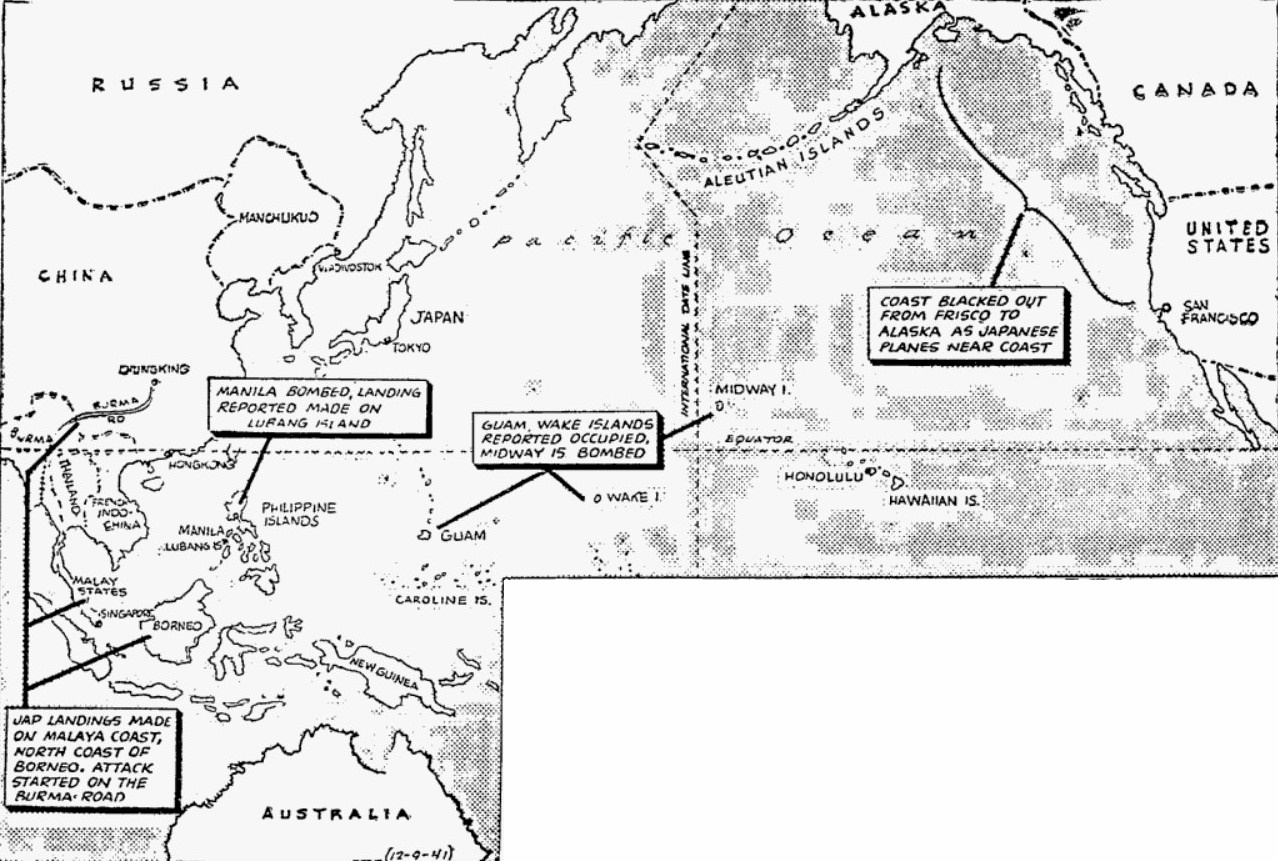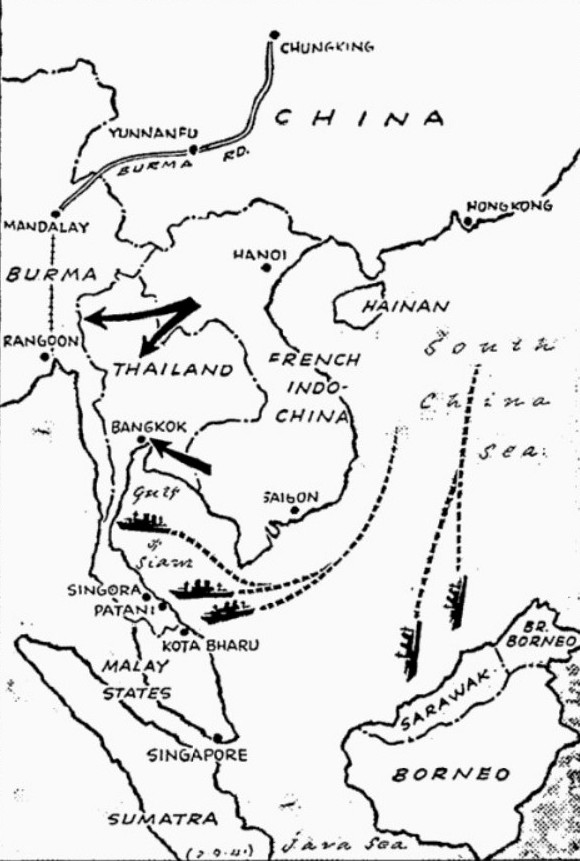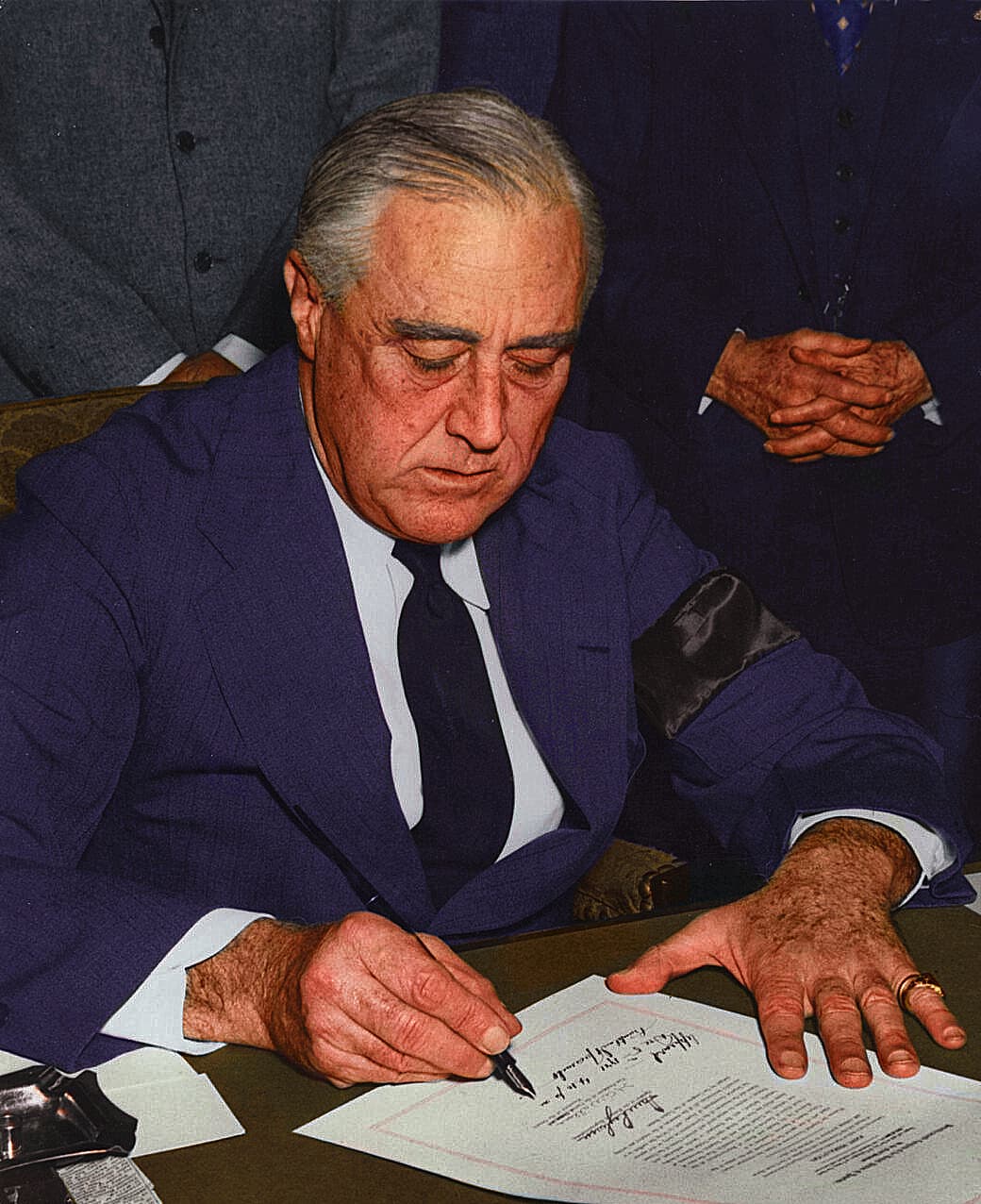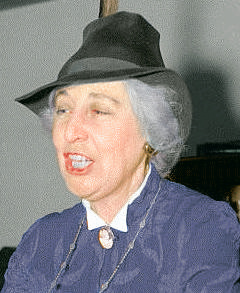Thought in defensive terms
Until less than a year ago, the designers of airplanes for the United States were told to think in defensive terms. Only within the last few months have the possibilities of offensive war in the form of mighty long-range bombers with large cruising speed, or numerous aircraft carriers capable of launching long-range bombing planes, been an integral part of American defense policy. And, of course, in time of emergency, the United States now does not have enough.
Congress is already giving voice to an undercurrent criticism against the Navy, little realizing that our air force for offense use against Japan is weaker than it should be largely because even as late as April 1940, Congress refused to bestir itself and vote large appropriations for airplane making.
But there is another phase to the criticism of those circumstances which today bring Americans face to face with their first major naval defeat in many decades of history. It is that somehow the civilian branch of the administration did not synchronize its advices and judgment too well with the naval branch of the government.
Danger was known
Inside the administration it was well known, for instance, that the militarists in Japan might at any moment commit an overt act. This has happened before in our relations with Japan as, for example, when the Panay was bombed in Chinese waters – an act later repudiated by the Japanese civilian officials in contact with our ambassador.
It was known here that the memoranda being exchanged might prolong the recent negotiations and that the militarists have felt themselves in no sense responsible always for keeping the foreign office at Tokyo advised of its plans. It is a reasonable supposition that neither Ambassador Nomura nor Saburo Kurusu knew of the impending attack. It would be like the militarists to use the diplomatic branch of the government to cover up preparations for attack and to keep that fact secret from everybody in the whole foreign service of Japan.
But in Washington when the first note was sent on November 26, which was a flat rejection of the Japanese viewpoint, it was known that the militarists might break loose. Why wasn’t the Navy ordered to be at posts of duty 24 hours a day when such a critical stage was reached in our relations with such an uncertain government as the Japanese has shown itself to be?
Questions will be asked
Under the American congressional system there are not the opportunities for interrogating the responsible officials of the executive branch of the government as under the parliamentary system, but some day there will be a lot of asking of questions and a lot of explaining just the same.
For while the barrage of accusations concerning the treachery of the Japanese is fully justified, it is also going to be important to know why the American Navy was not on the alert and why it had no way of determining the approach of hostile airplanes. The stories of listening devices that tell of the approach of enemy planes have been widely published heretofore, but no explanation is forthcoming as to why the detection was not made in the case of the Japanese on Sunday.
It will also be interesting to learn why the United States sent its note of November 26 if its navy was as unprepared as recent events show it to have been.
Congress is militant
It is too early to know exactly what did happen, and later explanations may present the attack in a different light in behalf of the Navy. But the mood of Congress, it must be reported, is militant today and it is a safe assumption that this war will start out with a far more offensive spirit than did the First World War.
Perhaps the defeat handed to the United States over the weekend will eliminate the boasting and overconfidence and make all concerned realize that it is poor policy to underestimate an enemy’s strength or fighting spirit and that it is wiser to prepare for the worst. Perhaps it will give our Navy the stimulus needed to carry on offensive war against the Japanese.
The attack on Hawaii may prove in the end to have been Japan’s greatest mistake in strategy, for it means early bombing of Japanese bases and cities – something which our air forces might have otherwise hesitated to begin.
The Pittsburgh Press (December 9, 1941)
FIERCE FIGHTING IN FAR EAST
Raid scares sweep East Coast; U.S. bombing of Tokyo reported
Formosa, Kobe also raided, Manila hints – Malaya battles rage
By Joe Alex Morris, United Press war editor
BULLETINS
Nationwide confusion was caused today by reports that “enemy aircraft” were seen on the East Coast. Coincident with the report, the Army and Navy Departments ordered all airfields on the alert.
The Boston Safety Committee issued the plane report. A responsible military official at Boston said that the unidentified plane may have been one sent out to test the air raid precaution system.
Brooklyn police ordered all schools evacuated, but later the “all-clear” signal was given and police were told to resume normal posts.
Reports circulated in New York that the scare was the result of an air raid precaution test which may have been ordered by defense officials.
Two air raid “alerts” were announced over WNYC, the radio station owned by New York City. Sirens were sounded in midtown, but traffic moved normally. The all-clear was sounded at 2:30 p.m. ET.
Lt. Gen. Delos Emmons, chief of the Army Air Force Combat Command, announced through the White House that while the Army had not confirmed the presence of any hostile aircraft off the Eastern Seaboard, “we’re taking no chances.”
Twenty Army interceptor planes swept over Hartford, Connecticut, this afternoon, heading toward Long Island Sound. They were followed by three pursuit ships.
About 280 planes took off on a reconnaissance flight from Mitchel Field, New York. Rifles, helmets and gas masks were issued to 7,500 men at the field.
The sounding of air raid alarms in Nassau County on Long Island caused authorities to send schoolchildren home with instructions not to return until notified.
The entire day shift of 14,000 men at the Bethlehem Steel Co. Fore River Shipyard at Quincy, Massachusetts, was sent home at 1:10 p.m.
New London, Connecticut, schools, stores and theaters were ordered closed for the day.
NEW YORK – NBC said today that a Panama radio broadcast reported Japanese aircraft flying over the Panama coast this morning but that no bombs were dropped.
American armed forces struck back at the Japanese in the Pacific today inflicting “considerable” losses on Japanese raiding planes in the Philippines and unconfirmed reports circulated that Tokyo, Kobe and Formosa have been attacked by U.S. bombers.
Today on the 6,000-mile battlefront in Pacific Ocean
Jap attacks in South Pacific
The Japanese were attacking in four sectors in the South Pacific today as indicated on the map above. A landing was attempted in North Borneo, additional Jap troops landed in the northern Malay States, others occupied Bangkok, Thailand’s capital, and Tokyo reported an attack launched on the Burma Road, China’s lifeline, through northern Thailand.
The spreading Pacific hostilities raised squarely the question of quick aid for Japan by her Axis partners, Germany and Italy. Russian participation in the Anglo-American war against Japan was still undetermined.
EVENTS:
PHILIPPINES: American defense forces inflict “considerable” losses on Japanese attacking planes; 25,000 Japanese nationals rounded up for detention; no official confirmation of reported Japanese land operations.
AXIS POWERS: Japanese spokesman at Tokyo says “of course” Japan expects Berlin and Rome to declare war on United States; Berlin prepares to announce stand tomorrow, possibly at Reichstag session; German embassy burns papers at Washington – usual prelude to severance of diplomatic relations or war.
TOKYO: German reports claim Japanese land in Philippines without losses; both air and naval bombardments of Midway Island, 1300 miles west of Hawaii reported; unreliable Rome radio circulates rumors Japanese fleet is steaming toward Hawaii to engage U.S. Fleet.
HONGKONG: British garrison, largely Canadian-manned, beats off Japanese attacks with artillery fire; Japanese air attacks cause little damage.
RUSSIA: Japanese spokesman claims relations with Soviet unchanged; Rome radio says same thing; Kuibyshev reports no Russian official statement but indicates there may be developments.
Official confirmation of raids on Japanese industrial and naval centers was lacking, but the German radio said that Tokyo had ordered air raid precautions in the areas north and southwest of the capital.
A Tokyo broadcast said that there had been no enemy planes over Japan up to 8:20 p.m. EST Monday but a Columbia Broadcasting System correspondent at Manila relayed rumors that the Japanese capital and Kobe, which is the center of an important naval yard, had been bombed.
Japanese airplanes bombed the Manila area by moonlight and returned to the islands this morning after a series of attacks that caused considerable damage at Clark Field, near Manila, and smashed at scattered objectives throughout the Philippines including Davao, Iba, Baguio and Tagueharao. One American naval ensign was killed at Davao and one was killed and 12 wounded at the United States Army station at Nichols Field.
There were persistent reports of Japanese landings on the island of Lubang, which lies off the entrance to Manila Bay and is about 80 miles from the Philippine capital. Official sources, however, declined to confirm these reports and also withheld confirmation of Japanese claims that Guam and Wake Islands had been taken.
Severe land fighting was in progress on the Malaya Coast, however, as the Japanese sought to strike toward Britain’s great naval base at Singapore.
Japanese seizure of Thailand facilitated the drive against northwestern Malaya, but British dispatches said that the enemy landing parties which gained a foothold on the beaches near Kota Bharu Airport were being wiped out.
Northward, where Thailand joins Burma and Indo-China, the Japanese were said by the Berlin radio to have opened an attack on the Burma Road supply route to China.
Japan was paying the greatest attention to the position of Germany and the Soviet Union toward the Far Eastern war, and indicated that immediate help was expected from the Axis powers.
The Japanese radio also issued an indirect warning to the Soviets to keep out of the conflict, asserting that Japanese-held Manchukuo is prepared to keep her northern frontiers intact.
Germany’s role in the Pacific conflict still was not clear, although the Axis spokesmen indicated that every assistance would be given Japan and a Montevideo newspaper reported that the 10,000-ton German pocket battleship Lutzow was already raiding off the South American coast.
Rumors circulated without official support that Germany might declare war against the United States, but Berlin sources described this as “improbable.”
These rumors – they still were plainly in the rumor category – would fit Axis blitzkrieg strategy of striking first and without warning.
They would also fit the sensational pattern of events on the Russian front where the Germans suddenly have announced that they have gone on the defensive for the winter.
A Nazi defensive stand in Russia this winter would enable Germany to turn its main war effort against Britain and the United States, presumably concentrating again against the British Isles, the north Atlantic and possibly throwing tremendous weight into an attack on British positions in the Middle East.
Rome, possible guided by wishful thinking, seemed to see a chance that the current technically non-belligerent relations between the Axis and the United States might continue indefinitely.
On the actual Pacific war front, there was action over a 6,000-mile front but no major new developments.
Other highlights:
HAWAII: Apparently quiet. No reports of renewed Japanese activity, no new word on operations of the U.S. battle fleet.
PHILIPPINES: Japanese inflict small casualties in moonlight air raids directed chiefly at Nichols Air Field and Ft. McKinley in Manila area; Japanese landing reported – but not confirmed – on Lubang Island, 80 miles from Manila.
GUAM: U.S. Army communique admits sinking of 840-ton minesweeper Penguin and a handful of casualties in Japanese attack on Guam; no confirmation that Japanese now have Guam.
JAPANESE CLAIMS: Offensive started against Burma Road; 200 “enemy” ships seized in Pacific, including 10,509-ton liner President Harrison; Japanese troops enter Bangkok. Midway Island attacked, 1,300 miles west of Hawaii; claim destruction of 300 American planes at Hawaii and the Philippines.
SINGAPORE: More Japanese troops land on Malaya coast, but British forces are successfully resisting. London claims number of Japanese landings is so small operation is only “mop up.”
MELBOURNE: Australia and New Zealand formalize war against Japan. The Japanese bomb Nauru and Ocean Islands, southeast of Guam and Wake.
Behind the scene of this military action, there was diplomatic activity on an even broader front.
Russia is silent
Important diplomatic activity was underway at Kuibyshev, temporary Russian headquarters. Russia was officially silent on the Japanese attack but “important developments” were expected. A dispatch from the United Press correspondent, Henry Shapiro, said that Russia has long recognized the strategic potentialities of the Pacific war now underway.
France, it appeared, was swinging rapidly into a full-time position in the Axis orbit.
Reports to the United Press from European sources said that Adm. Jean Francois Darlan, Vichy vice premier, is en route to meeting with Count Galeazzo Ciano, Italian foreign minister, and possibly Premier Benito Mussolini.
The meeting was expected to consider the question of French Tunisia and seemed to be designed to effect a Franco-Italian settlement as a prelude to full French participation in the Axis sphere.
This may indicate that French arrangements with Germany for joint use of French African bases are about to be completed, presumably spurred by the prospect of full American involvement in war with the whole Axis.
Pope deplores war spread
At Vatican City Pope Pius XII deplored the spread of the war.
In Latin America support for the United States was sweeping ahead. Panama declared war on Japan, the eighth Latin nation to do so. Uruguay was to consider a declaration later today. Argentina was taking a lead in a policy of hemispheric solidarity under which the United States, as the victim of an aggressor’s attack, will be considered a non-belligerent.
There was heavy fighting reported in Libya. On the Russian front the Germans, in line with their new policy, said nothing but local action is in progress. The Russians, however, claimed that the German 12th and 33rd Motorized Divisions and the 4th Panzer Division were hurled into retreat on the vital Stalinogorsk sector, south of Moscow.
WAR BULLETINS!
LaGuardia, First Lady on coast
LOS ANGELES – Mayor Fiorello LaGuardia, Mrs. Franklin D. Roosevelt and their aides arrived here by plane today for a conference with California officials on civilian defense.
Nazi raider reported off Argentina
MONTEVIDEO, Uruguay – The newspaper El País reported today that the German pocket battleship Lutzow was raiding off the Argentine coast. There was no confirmation from other sources. The Lutzow is a 10,000-ton, heavily armored vessel and a sister ship of the scuttled Graf Spee.
Aleutian report unconfirmed
VICTORIA, British Columbia – A statement by Maj. Andrew McGavin of Victoria that “the Japanese had been reported off the Aleutian Islands” could not be confirmed from official or semi-official sources today. The major issued his statement last night.
Capitol dome darkened
WASHINGTON – Capitol Architect David Lynn today ordered the floodlights which illuminate the Capitol dome at night turned off until the war is over.
Four American ships reported sunk
NEW YORK – The German radio reported today that four American merchant vessels were sunk in the Pacific by the Japanese and that the first American naval prisoners have been brought to Tokyo.
Jap aircraft carrier reported sunk
MANILA – A totally unconfirmed rumor circulated today that a Japanese aircraft carrier had been sunk off Zambales, on the west coast of Luzon, north of Manila.
Mexico reported at war
NEW YORK – NBC today heard the Panama radio report that Mexico had declared war on Japan.
Anti-air units guard plants
BOSTON – The Army sent four anti-aircraft regiments, totaling 6,000 men into vital defense production areas today. The 198th Coast Artillery Regiment from Fort Ontario, New York, and the 67th Coast Artillery unit from Fort Bragg, North Carolina, will be stationed in Rhode Island and Connecticut, and the 68th and 208th Anti-Aircraft Mobile Regiments from Camp Edwards, Massachusetts, will be stationed in the Boston area.
Capital defense plans made
WASHINGTON – The Navy today announced the creation of a Potomac River naval command, apparently designed to coordinate defense of the capital from attacks by sea as well as to protect naval establishments in the area.
White House ready for blackout
WASHINGTON – Preparations have been made to black out the White House when and if a general blackout is ordered for the District of Columbia.
Jap air raid plans reported
LONDON, England – The German radio reported today that Japanese authorities have ordered air raid precautions north and south of Tokyo.
Fleet concentration reported
NEW YORK – NBC today heard Radio Saigon report “considerable concentrations of Japanese fleet units in Indo-China waters.” Weather was reported as “unfavorable.”
Calais raid kills 37, hurt 20
VICHY – Thirty-seven civilians were killed and 20 seriously wounded when British planes bombed Calais, occupied France, yesterday, it was announced today.
East Indies mobilized
NEW YORK – The Netherlands East Indies completed mobilization of the army and requisitioned a large part of the merchant marine today to war against Japan. It was announced that the Dutch colony’s cruisers, destroyers, submarines and other naval units would cooperate with the British Eastern Fleet.
South Africa to join war
CAPE TOWN, South Africa – Constitutional formalities held up the Union of South Africa’s declaration of war against Japan, but authoritative quarters said a declaration was certain.
Jap attack reported halted
HONG KONG – A British communique tonight reported that Hong Kong’s artillery batteries opened up on Japanese attackers and “halted their advance.” It was presumed the Japanese are on the mainland opposite this island. One Japanese plane was reported crippled.
‘Nazi pattern’ will be topic of Roosevelt
Broadcast tonight to give details of Hitler’s part in Pacific war
By Lyle C. Wilson, United Press staff writer
President Roosevelt blots his signature on the joint congressional resolution declaring that a state of war exists between the United States and Japan after affixing his signature at 4:10 p.m. yesterday in the White House executive offices. The resolution was rushed to the president within four hours of his request for the declaration.
WASHINGTON (UP) – President Roosevelt’s address to the nation tonight will be devoted largely to a discussion of “the Nazi pattern” of the present war involving the United States, the White House said today.
Secretary Stephen Early said at a press conference that the chief executive would spend most of the day working on his address, which would deal more with “the Nazi pattern of this overall situation” than with specific details of war operations with Japan in the Pacific.
ROOSEVELT TO SPEAK
The President speaks at 10 p.m. EST tonight. All Pittsburgh stations will broadcast the address.
Follows accusation
Mr. Early’s comment followed the White House accusation yesterday that Germany had done everything possible to push Japan into the war against this country. Congressional leaders have signified instant willingness to acknowledge war with Germany and Italy as well if those two Axis partners join Japan.
Reports from Germany that the Nazi position would be clarified perhaps within the next 24 hours led administration officials here to prepare for any contingency.
A hint as to possible things to come was a report unconfirmed that the German Embassy had begun to burn secret papers, usually a forerunner to a break in diplomatic relations. The embassy had “no comment” on the reports.
Asked for latest news of the war as received by the White House, Mr. Early said the president had checked his official dispatches with newspaper stories on the Battle of the Pacific and had found that the newspapers had most of the facts that the government has at this time.
About reports of air raids on San Francisco, Mr. Early said “you know as much about it as the president does.”
Asked about planes
“How was it, if the reports from San Francisco are true, the Japanese planes could get so near our west coast?” Mr. Early was asked.
“You can be sure that the Army and Navy on the president’s instructions are on the alert for defense,” he said, adding that this alert not only involved the Pacific Coast and San Francisco, but other areas.
“The picture is much bigger,” Mr. Early added.
Mr. Early had no additional information on the situation in Hawaii. Asked whether our losses in the Japanese attack on Pearl Harbor constituted “the worst naval disaster in our history,” he said he could not reply except to reiterate his statement of yesterday that “our losses were heavy and subsequent reports show the losses to be heavier than first reported.”
To give out rumors
“The president insists that rumors and reports be given you as received, then these rumors and reports will be sifted for the truth,” Mr. Early said. “We are in the sifting process now.”
Before starting in for a long session of speech writing, the president at 11 a.m. held a “checkup conference” with the secretaries of War and Navy, the vice president and members of the Supply Priorities and Allocation Board.
The president will speak for a full hour tonight, Mr. Early said.
Asked about Axis reports of American naval losses, Mr. Early reminded reporters that “these countries have been putting out these reports since the beginning of the war and up until a few days ago, they dealt principally with Great Britain.”
“I think,” he added, “you know them for what they are.”
To issue more news
Further news from Hawaii, which was hard hit by the Japanese attack, undoubtedly will be made available to be public shortly after it is received by the government, Mr. Early said.
It probably is no exaggeration to say that the U.S. Navy suffered its greatest loss of all its valiant history in the Pearl Harbor engagement. But that statement, which is being made by responsible and well-informed members of Congress, must be qualified by acknowledgment that our modern Navy never previously has suffered any major battle loss at all.
After 48 hours of war, it appeared that Japan and the Axis had won the headlines and the radio bulletins if nothing else. For the most part, the American public is reading and hearing of apparently successful, damaging and astonishing Japanese air attacks on our bases, on units of the fleet and on our shipping.
See attack in Atlantic
From foreign diplomatic sources here came a suggestion that the United States also is preparing against a surprise attack in the Atlantic similar to that which enabled Japan to swoop down on our fleet in Pearl Harbor, Hawaii, and upon scores of planes grounded on adjacent fields. Yesterday’s report from Honolulu that all had been quiet there since Sunday’s surprise raid was offset by moonlight attacks on vital American air bases in the Philippines and reports that isolated island outposts had been captured.
An official German DNB News Service report, heard last night by the United Press listening station, hinted that Germany would act without notice against the United States and other nations which are at war with Japan.
Ready to fight Germany
House Speaker Sam Rayburn countered with the statement that Congress would be ready to acknowledge war in the same brisk fashion which yesterday enabled both houses to vote a war resolution 33 minutes after Mr. Roosevelt had requested it.
The president signed the historic document at 4:10 p.m. yesterday with firm hand while cameras recorded the event for posterity.
His signature formally plunged a united America into the holocaust of World War II.
The measure is known as Joint Resolution 116. It declares “a state of war exists between the Imperial Government of Japan and the Government and people of the United States.”
The Senate vote was unanimous, 82-0.
The House shouted approval, 388-1.
Lone dissenter on the fateful issue was Rep. Jeannette Rankin, R-Montana. Her “no” was voiced calmly, but her eyes were red from weeping.
There seemed to be disappointment in Congress from the top leadership down on our showing – so far as it is known to them and the public – in the first round of the war in the Pacific.
One ship capsizes
The White House announcement was that one old battleship had been hit and capsized in Pearl Harbor, that a destroyer was blown up and that other units were hit, although not necessarily put out of action. Meanwhile, German, Italian and Japanese broadcasts were claiming far greater damage.
As the nation plunged into the Pacific war, our relations with the other Axis powers steadily disintegrated. The White House opened fire on Berlin with a charge that Germany had sought to push Japan into the war in the hope of interrupting the flow of lend-lease supplies to Great Britain and to the Soviet Union. The statement said German claims that lend-lease aid would be hindered were further proof that Berlin’s propaganda was “continuously, completely and 100 percent inaccurate.” Lend-lease aid will continue in full operation, the statement said with some emphasis.
Warns of less aid
But Prime Minister Winston Churchill, speaking from London, warned that our sudden emergency in the Pacific would tend somewhat to diminish the immediate flow of material, although his remarks in nowise supported German contentions.
There was no indication here how or where the Axis might strike at the United States in the Atlantic. But the mere possibility of such a move again raised speculation regarding Atlantic islands in neutral or semi-Axis hands such as Martinique in the West Indies (a possession of Vichy France), and the Canaries, Cape Verde Islands and Azores (possessions, respectively, of Spain and Portugal).
Some diplomats speculated that, with the United States engaged in the Pacific, Germany might dare to pool naval strength with the French – assuming Vichy would agree – for a sortie into the Atlantic.
Harbors plane carrier
Martinique is important not only because of its strategic location, but because it harbors the French aircraft carrier Bearn, a cruiser and some auxiliary craft. On Martinique is the French gold hoard estimated at from 200 to 500 million dollars.
Broadcast reports from Manila hinted yesterday that the Philippines were substantially cut off from supply lines for oil and other such vital materials not produced there. And in addition to the Japanese surface and air force which can attack or hamper American-Philippine supply lines, it is presumed that German ships are going into action.
There are about a dozen German commercial vessels in Japanese ports available either as armed raiders of supply ships or raiding vessels. These include the liner Scharnhorst which easily could be converted into a light cruiser-type raider. And Japan, presumably, would provide bases for any German-manned raiders which may be able to reach the Pacific. All of which adds up to a prospect of intense raiding activity in that area.
Dissenter in Congress calls vote premature
Rep. Rankin
WASHINGTON (UP) – Rep. Jeannette Rankin, R-Montana, the only member of Congress to vote against the declaration of war on Japan, believes that Congress acted prematurely.
Congress has had no definite confirmation that the Japanese really were responsible, she said.
Miss Rankin’s vote was also based on her “horror of war and killing.” The 61-year-old congresswoman, who voted against America’s entry into the last World War, locked her office door and declined to discuss the matter further with reporters.
A few minutes before the roll call began, Miss Rankin was on her feet seeking recognition. Speaker Sam Rayburn, D-Texas, ordered the roll call to proceed, however, and she had no opportunity to explain her position to members of the House.
Repeal of ban on AEF given committee OK
Removal of time limit also voted; age range of 18-44 hinted
WASHINGTON (UP) – Congress today speeded legislation to permit retention of all soldiers and sailors in service for the duration of the war and to eliminate geographical restrictions on use of selectees and National Guardsmen.
Within a few hours:
-
The House Military Affairs Committee approved a bill eliminating from the Selective Service Act provisions which confines use of Selectees and Guardsmen to the Western Hemisphere or possessions of the United States. It would also permit retention of all Army men until six months after the war ends.
-
The House passed unanimously and sent to the White House a bill permitting the Navy to retain all enlisted men “for the duration.”
-
One source said the Army plans to ask Congress “today or tomorrow” to increase the draft age limits from the present 21-28 range to 18-44. This was not confirmed.
Chairman Andrew J. May, D-Kentucky, of the House Military Affairs Committee, said the Army had not yet requested any such age changes and that there had been no discussion of it within the committee.




